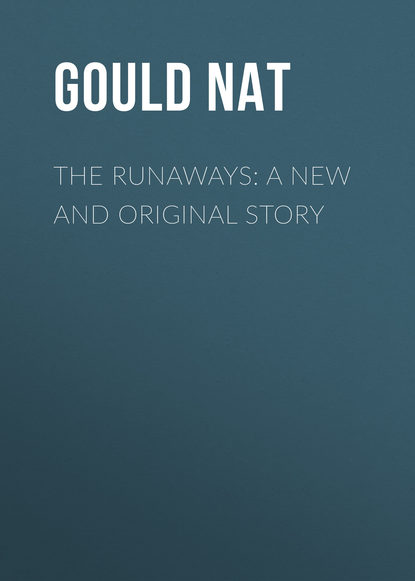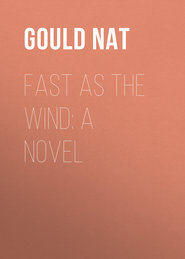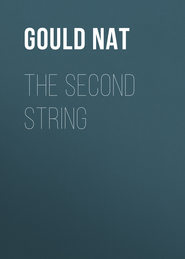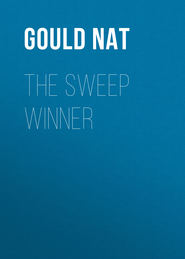По всем вопросам обращайтесь на: info@litportal.ru
(©) 2003-2024.
✖
The Runaways: A New and Original Story
Настройки чтения
Размер шрифта
Высота строк
Поля
"Betting?"
"Mostly, but I am out of the mire now, and intend to keep so," he replied.
"A good resolution. Why did you not offer me the Farm? I would have given you a better price for it."
"Because, to tell you the truth, I was ashamed to."
"You ought to have come to me, Warren," said the Squire, kindly, as he placed one hand on his shoulder. "I gave you Irene, and you ought to trust me. She was confided to my care by my old friend, Carstone, and I do not want to think I have made a mistake in placing her happiness in your hands. You do not look easy in your mind, or happy. If you are in any difficulty tell me, and I will do all in my power to help you for her sake and your own."
These words struck the right chord in Warren Courtly, but he had not the courage to confess what he had done.
"I am upset over selling Holme Farm," he replied, "but there is nothing else, except the barefaced audacity of such a man as Felix Hoffman writing to Irene."
"You know the man?"
"Yes, and I told her he was a scoundrel. He shall feel my stick across his shoulders the next time we meet."
"Better to have no scenes," said the Squire. "Avoid him in the future, but give him to understand there must be no more letters written, or he will be handed over to the police."
"That will probably be the best way. I met him casually at Hurst Park, and he gave me some very good information."
"And on the strength of that," said the Squire, "I suppose he has stuck to you like a leech. I know these men, they ought to be ducked in a horsepond, they are pestilential nuisances, but unfortunately there is no way of killing them off."
Warren Courtly rode home, where another unpleasant surprise awaited him. Irene had received a second letter from Felix Hoffman, returning the five pounds and thanking her for the loan.
"There," said Irene. "I am right, and the Squire is wrong. I felt sure from the tone of his letter he would return the money, so he cannot be quite so black as you painted him."
"I am very much surprised, I assure you," said Warren, "but the return of the money does not do away with the fact that it was a gross piece of impertinence on his part to write to you, and I shall call him to account for it."
This letter, returning the money, caused Warren Courtly much uneasiness. He knew it meant that Felix Hoffman was playing some clever game, and that trouble was brewing at no distant date. It was seldom Hoffman allowed a five-pound note to leave his possession, no matter how he obtained it. When he did so, it was generally with the certainty of getting many times its value in return.
CHAPTER IX
HOW ULICK BOUGHT THE SAINT
When Ulick Maynard returned to London after his brief visit to Eli Todd at Hazelwell, he went to his rooms in West Kensington. Here he had a comfortable flat, and lived as happily as possible under the circumstances. He missed his father's company; they were always together, and there had never been angry words between them until the night he left home. He sometimes wondered had he done right to leave Hazelwell in a sudden burst of anger, but he could not have remained under such a cloud of suspicion as his father enveloped him in.
If his father believed him guilty, what would the neighbours think? They would naturally one and all condemn him, so it was no doubt for the best he had gone away for a time.
London is the safest place in the world for a man to come to if he wishes to keep away from his friends and relations. It is a difficult matter to find anyone in the midst of the huge whirl of traffic and millions of people constantly pouring along its myriad thoroughfares.
Ulick avoided no one, nor did he shun any places he wished to visit, lest he might be recognised. He went about the same as any casual visitor to the city, and although he had been to London many times he had never become so well acquainted with it before.
At first time hung heavily on his hands. He missed all his country pursuits; the noise of the city jarred upon him, and he longed for the murmur of the stream, the sough of the wind amongst the trees, the rustle of the grass, the songs of birds, the lowing of cattle, the bleating of sheep and lambs, and, more than all, the merry neighing of the horses, and the joyous bark of Bersak. He felt cramped, cooped up, unable to breathe freely, and his whole being revolted at the scenes around him. For hours he roamed the vast city, watching the human wrecks, the flotsam and jetsam of mankind, being tossed about in the whirlpool of London life, and wondered what became of them all, where they housed at night, where they ended their days, how they died, and if any living soul mourned their departure.
Christmas came soon after his arrival in London. It was the most dismal one he ever spent, and he knew at Hazelwell there would be a corresponding gloom. His heart was hardened against his father then, and it was with some amount of equanimity that he thought the Squire also suffered alone and in silence. Christmas Eve he spent in the city, and watched the children returning home ladened with toys and a variety of parcels, their little arms clasped round their treasures, holding them tight, fearful lest some mishap should befall them. He saw the worn faces of hard-working parents glowing with pride and joy at the thought that out of their toil they had been able to save something for their little ones' pleasure. Late that night he saw sights that made him shudder, and as he passed woman after woman he was half afraid to look at them, so utterly abandoned were their faces.
As he crossed Trafalgar Square he heard a faint moan, and looking in the direction from whence it came he saw a tiny boy and girl huddled close together on a seat. It was a bitterly cold night, and London was clothed in a dirty, drizzling sleet. He crossed over to the children, and the boy, pulling the girl closer to him, looked at him with big, starving, staring eyes. He questioned them and found they had no home, no place wherein to lay their heads, and they meant to remain there for the night, unless the policeman moved them on, or took them away. He asked if they could find lodgings if he gave them the money, and the boy said he could, but looked incredulous at the prospect of such good fortune.
Ulick gave him ten shillings in silver, and when the lad saw it in his hand he cried for joy and roused his sister to look at the harvest. She inquired what the coins were, and he said shillings, and that they would last them for many days, until long after Christmas.
They showered thanks upon Ulick in their childish way, and then trudged across the Square with their arms round each other. They looked back as they reached the Strand, and he waved his hand to them. That night he slept badly, he wondered why there was so much misery in the world.
Time passed on, and early in the spring he commenced to think a little racing would be a pleasant recreation. He had no occasion to hide from his fellows, for he had done no wrong, and could hold his head high with the rest of them.
He went to Epsom and saw the City and Suburban, and while there he met his father's old trainer, Fred May, who was delighted to see him again. The Squire had not raced much during the past few years, generally selling his yearlings at Newmarket. Fred May had won him many good races, and trained Honeysuckle when she won her big event.
Ulick did not tell the trainer that he had left Hazelwell, he saw no necessity for it. They chatted about old times, and May made many inquiries about the Squire.
"Do you think he will ever race again?" asked May.
"I don't fancy he will, but I shall, and I should not mind speculating in something useful and handing it over to your care," replied Ulick.
"You really mean it?" said Fred May.
"Of course I do," laughed Ulick.
"Then I know where you can buy a youngster that will come out at the top of the tree, and if he is well-trained will make a grand three-year-old."
"A two-year-old now?" asked Ulick.
"Yes; he is by Father Confessor out of Hilda, and is known as the Saint. He has not run yet, but you can accept my word for it he is a flyer. He's at Epsom, at Lowland Lodge, and we can have a look at him after the races."
"Is the figure high? I do not wish to give a big price, and I would have rather bought a three or four-year-old," said Ulick.
"Buy the Saint if you can, you will never regret it," said the trainer.
After the races they walked down to Lowland Lodge and inspected the Saint.
"Why, he's a grey!" exclaimed Ulick, in a disappointed tone, as the door of the box was opened.
"And there's been many a good grey racehorse," replied Fred May. "Never mind the colour. Look him over, and fancy he is a bright bay, or brown, or a chestnut, or anything you like, only forget he's a grey, and then I'm sure you will not find a fault in him."
Ulick was no mean judge of blood horses, and, acting on the trainer's advice and ignoring the colour, he looked the Saint carefully over. He was rather anxious to find an excuse for declining to buy him, but he failed; he was unable to "fault" the colt in any way. He was well shaped all over. His legs were sound and clean, also his feet, well let down behind, tapering off like a greyhound; he had also a strong back and loins, and muscular thighs. There was plenty of him in front of the saddle, and his shoulders sloped well, his neck set on perfectly, and his head denoted courage and endurance. He seemed to be shaped for speed, and evidently possessed staying powers. His colour was not prepossessing, for he was not a good grey, and this was the only fault Ulick could find with him.
"Well!" exclaimed the trainer, with a smile, when he saw he had finished his inspection, "what do you think of him?"
"He is perfect in everything except his colour. I must say he is about as bad a colour as a racehorse well could be," replied Ulick.
"Granted that is so, his colour will not prevent him winning. Do you recollect Buchanan winning the Lincolnshire Handicap? No, of course not, what am I thinking of? You were a little chap then, I expect. Well, he was a funny looking grey, something after the style of the Saint, but he spread-eagled his field that day, and no mistake. The race was run in a snowstorm, and he faced it like a lion; it blew straight down the course, and it was no light thing for a horse to meet it in his teeth. He was a good grey, and I have known others; it is all prejudice, the colour is all right if the horse is good enough."
Ulick hesitated. He felt tempted to buy, for he knew Fred May's judgment was sound, and that he seldom made mistakes. He had not yet asked the price, perhaps it would be prohibitory – he almost hoped so.
The owner of the Saint was anxious to sell him for the same reason that Ulick hesitated about buying; he did not like his colour. On this account he asked a price that he thought would tempt a wavering purchaser.
Two hundred guineas was the price placed upon the Saint, and Ulick was forced to acknowledge it was reasonable. He had seen yearlings sold for five times the amount that had turned out utter failures, and here was a two-year-old that in all probability would make a clinker.
Fred May made no remark when he heard the price asked for the Saint, but he was determined if Ulick did not buy him he would.
"Mostly, but I am out of the mire now, and intend to keep so," he replied.
"A good resolution. Why did you not offer me the Farm? I would have given you a better price for it."
"Because, to tell you the truth, I was ashamed to."
"You ought to have come to me, Warren," said the Squire, kindly, as he placed one hand on his shoulder. "I gave you Irene, and you ought to trust me. She was confided to my care by my old friend, Carstone, and I do not want to think I have made a mistake in placing her happiness in your hands. You do not look easy in your mind, or happy. If you are in any difficulty tell me, and I will do all in my power to help you for her sake and your own."
These words struck the right chord in Warren Courtly, but he had not the courage to confess what he had done.
"I am upset over selling Holme Farm," he replied, "but there is nothing else, except the barefaced audacity of such a man as Felix Hoffman writing to Irene."
"You know the man?"
"Yes, and I told her he was a scoundrel. He shall feel my stick across his shoulders the next time we meet."
"Better to have no scenes," said the Squire. "Avoid him in the future, but give him to understand there must be no more letters written, or he will be handed over to the police."
"That will probably be the best way. I met him casually at Hurst Park, and he gave me some very good information."
"And on the strength of that," said the Squire, "I suppose he has stuck to you like a leech. I know these men, they ought to be ducked in a horsepond, they are pestilential nuisances, but unfortunately there is no way of killing them off."
Warren Courtly rode home, where another unpleasant surprise awaited him. Irene had received a second letter from Felix Hoffman, returning the five pounds and thanking her for the loan.
"There," said Irene. "I am right, and the Squire is wrong. I felt sure from the tone of his letter he would return the money, so he cannot be quite so black as you painted him."
"I am very much surprised, I assure you," said Warren, "but the return of the money does not do away with the fact that it was a gross piece of impertinence on his part to write to you, and I shall call him to account for it."
This letter, returning the money, caused Warren Courtly much uneasiness. He knew it meant that Felix Hoffman was playing some clever game, and that trouble was brewing at no distant date. It was seldom Hoffman allowed a five-pound note to leave his possession, no matter how he obtained it. When he did so, it was generally with the certainty of getting many times its value in return.
CHAPTER IX
HOW ULICK BOUGHT THE SAINT
When Ulick Maynard returned to London after his brief visit to Eli Todd at Hazelwell, he went to his rooms in West Kensington. Here he had a comfortable flat, and lived as happily as possible under the circumstances. He missed his father's company; they were always together, and there had never been angry words between them until the night he left home. He sometimes wondered had he done right to leave Hazelwell in a sudden burst of anger, but he could not have remained under such a cloud of suspicion as his father enveloped him in.
If his father believed him guilty, what would the neighbours think? They would naturally one and all condemn him, so it was no doubt for the best he had gone away for a time.
London is the safest place in the world for a man to come to if he wishes to keep away from his friends and relations. It is a difficult matter to find anyone in the midst of the huge whirl of traffic and millions of people constantly pouring along its myriad thoroughfares.
Ulick avoided no one, nor did he shun any places he wished to visit, lest he might be recognised. He went about the same as any casual visitor to the city, and although he had been to London many times he had never become so well acquainted with it before.
At first time hung heavily on his hands. He missed all his country pursuits; the noise of the city jarred upon him, and he longed for the murmur of the stream, the sough of the wind amongst the trees, the rustle of the grass, the songs of birds, the lowing of cattle, the bleating of sheep and lambs, and, more than all, the merry neighing of the horses, and the joyous bark of Bersak. He felt cramped, cooped up, unable to breathe freely, and his whole being revolted at the scenes around him. For hours he roamed the vast city, watching the human wrecks, the flotsam and jetsam of mankind, being tossed about in the whirlpool of London life, and wondered what became of them all, where they housed at night, where they ended their days, how they died, and if any living soul mourned their departure.
Christmas came soon after his arrival in London. It was the most dismal one he ever spent, and he knew at Hazelwell there would be a corresponding gloom. His heart was hardened against his father then, and it was with some amount of equanimity that he thought the Squire also suffered alone and in silence. Christmas Eve he spent in the city, and watched the children returning home ladened with toys and a variety of parcels, their little arms clasped round their treasures, holding them tight, fearful lest some mishap should befall them. He saw the worn faces of hard-working parents glowing with pride and joy at the thought that out of their toil they had been able to save something for their little ones' pleasure. Late that night he saw sights that made him shudder, and as he passed woman after woman he was half afraid to look at them, so utterly abandoned were their faces.
As he crossed Trafalgar Square he heard a faint moan, and looking in the direction from whence it came he saw a tiny boy and girl huddled close together on a seat. It was a bitterly cold night, and London was clothed in a dirty, drizzling sleet. He crossed over to the children, and the boy, pulling the girl closer to him, looked at him with big, starving, staring eyes. He questioned them and found they had no home, no place wherein to lay their heads, and they meant to remain there for the night, unless the policeman moved them on, or took them away. He asked if they could find lodgings if he gave them the money, and the boy said he could, but looked incredulous at the prospect of such good fortune.
Ulick gave him ten shillings in silver, and when the lad saw it in his hand he cried for joy and roused his sister to look at the harvest. She inquired what the coins were, and he said shillings, and that they would last them for many days, until long after Christmas.
They showered thanks upon Ulick in their childish way, and then trudged across the Square with their arms round each other. They looked back as they reached the Strand, and he waved his hand to them. That night he slept badly, he wondered why there was so much misery in the world.
Time passed on, and early in the spring he commenced to think a little racing would be a pleasant recreation. He had no occasion to hide from his fellows, for he had done no wrong, and could hold his head high with the rest of them.
He went to Epsom and saw the City and Suburban, and while there he met his father's old trainer, Fred May, who was delighted to see him again. The Squire had not raced much during the past few years, generally selling his yearlings at Newmarket. Fred May had won him many good races, and trained Honeysuckle when she won her big event.
Ulick did not tell the trainer that he had left Hazelwell, he saw no necessity for it. They chatted about old times, and May made many inquiries about the Squire.
"Do you think he will ever race again?" asked May.
"I don't fancy he will, but I shall, and I should not mind speculating in something useful and handing it over to your care," replied Ulick.
"You really mean it?" said Fred May.
"Of course I do," laughed Ulick.
"Then I know where you can buy a youngster that will come out at the top of the tree, and if he is well-trained will make a grand three-year-old."
"A two-year-old now?" asked Ulick.
"Yes; he is by Father Confessor out of Hilda, and is known as the Saint. He has not run yet, but you can accept my word for it he is a flyer. He's at Epsom, at Lowland Lodge, and we can have a look at him after the races."
"Is the figure high? I do not wish to give a big price, and I would have rather bought a three or four-year-old," said Ulick.
"Buy the Saint if you can, you will never regret it," said the trainer.
After the races they walked down to Lowland Lodge and inspected the Saint.
"Why, he's a grey!" exclaimed Ulick, in a disappointed tone, as the door of the box was opened.
"And there's been many a good grey racehorse," replied Fred May. "Never mind the colour. Look him over, and fancy he is a bright bay, or brown, or a chestnut, or anything you like, only forget he's a grey, and then I'm sure you will not find a fault in him."
Ulick was no mean judge of blood horses, and, acting on the trainer's advice and ignoring the colour, he looked the Saint carefully over. He was rather anxious to find an excuse for declining to buy him, but he failed; he was unable to "fault" the colt in any way. He was well shaped all over. His legs were sound and clean, also his feet, well let down behind, tapering off like a greyhound; he had also a strong back and loins, and muscular thighs. There was plenty of him in front of the saddle, and his shoulders sloped well, his neck set on perfectly, and his head denoted courage and endurance. He seemed to be shaped for speed, and evidently possessed staying powers. His colour was not prepossessing, for he was not a good grey, and this was the only fault Ulick could find with him.
"Well!" exclaimed the trainer, with a smile, when he saw he had finished his inspection, "what do you think of him?"
"He is perfect in everything except his colour. I must say he is about as bad a colour as a racehorse well could be," replied Ulick.
"Granted that is so, his colour will not prevent him winning. Do you recollect Buchanan winning the Lincolnshire Handicap? No, of course not, what am I thinking of? You were a little chap then, I expect. Well, he was a funny looking grey, something after the style of the Saint, but he spread-eagled his field that day, and no mistake. The race was run in a snowstorm, and he faced it like a lion; it blew straight down the course, and it was no light thing for a horse to meet it in his teeth. He was a good grey, and I have known others; it is all prejudice, the colour is all right if the horse is good enough."
Ulick hesitated. He felt tempted to buy, for he knew Fred May's judgment was sound, and that he seldom made mistakes. He had not yet asked the price, perhaps it would be prohibitory – he almost hoped so.
The owner of the Saint was anxious to sell him for the same reason that Ulick hesitated about buying; he did not like his colour. On this account he asked a price that he thought would tempt a wavering purchaser.
Two hundred guineas was the price placed upon the Saint, and Ulick was forced to acknowledge it was reasonable. He had seen yearlings sold for five times the amount that had turned out utter failures, and here was a two-year-old that in all probability would make a clinker.
Fred May made no remark when he heard the price asked for the Saint, but he was determined if Ulick did not buy him he would.









